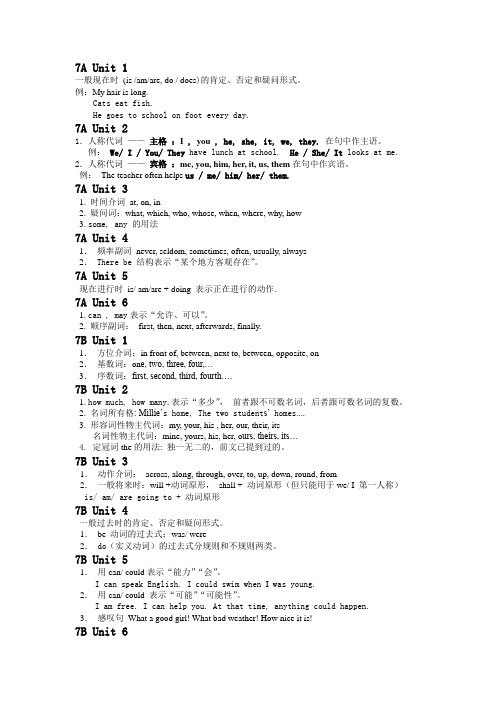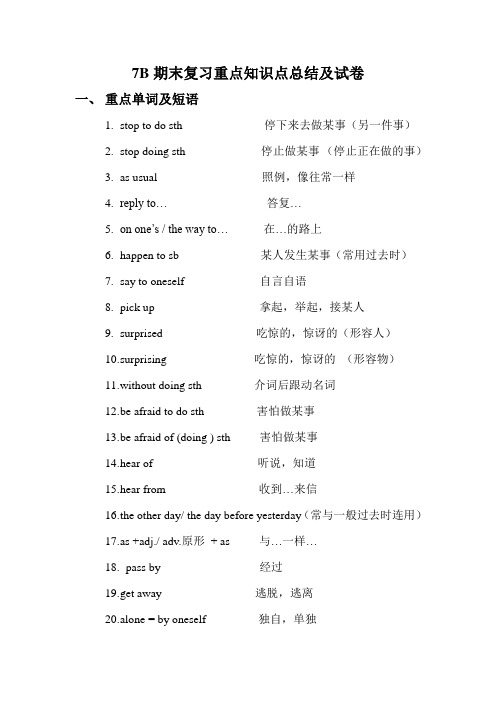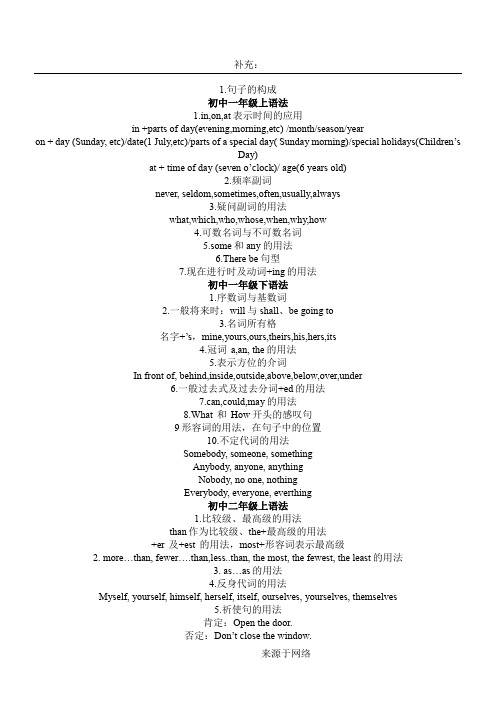江苏省初中牛津英语重要知识点
牛津英语初中知识点集锦

7A Unit 1一般现在时(is /am/are, do / does)的肯定、否定和疑问形式。
例:My hair is long.Cats eat fish.He goes to school on foot every day.7A Unit 21.人称代词——主格:I , you , he, she, it, we, they. 在句中作主语。
例: We/ I / You/ They have lunch at school. He / She/ It looks at me. 2.人称代词——宾格:me, you, him, her, it, us, them在句中作宾语。
例:The teacher often helps us / me/ him/ her/ them.7A Unit 31. 时间介词at, on, in2. 疑问词:what, which, who, whose, when, where, why, how3. some, any 的用法7A Unit 41.频率副词never, seldom, sometimes, often, usually, always2.There be 结构表示“某个地方客观存在”。
7A Unit 5现在进行时is/ am/are + doing 表示正在进行的动作.7A Unit 61. can , may表示“允许、可以”。
2. 顺序副词:first, then, next, afterwards, finally.7B Unit 11.方位介词:in front of, between, next to, between, opposite, on2.基数词:on e, two, three, four,…3.序数词:first, second, third, fourth….7B Unit 21. how much, how many.表示“多少”,前者跟不可数名词,后者跟可数名词的复数。
牛津译林九年级上学期英语知识点汇总

新译林英语9A UNIT1-UNIT8 词组重点句型知识点归纳Unit 1 Know yourself 知识点汇总一、词组、短语归纳Welcome to the unit1.It says 上面写着,上面显示2.eat up 吃光,吃完(use up 用完,用尽)3.be well organized 很有条理的4.keep … in good order 使……保持井然有序(in order 按顺序)5.show off 炫耀,卖弄6.show sb around sp 带领某人参观某地7.show sb the way to 给某人指到某地的路8.show no interest in 对……毫不感兴趣9.repeat grammar rulers for us 为我们重复语法规则e up with = think of 想出,提出;11.be curious about 对…感到好奇12.get angry easily 容易生气13.make a good accountant 成为一名优秀的医生14.neither ……nor ……既不……也不……(就近原则)Neither he nor I am well educated.He didn’t come here yesterday , neither / nor did I. 他昨天没来这儿,我也是15.work without speaking all day long 整天工作不说话Reading16.be happy with = be satisfied with 对……感到满意17. a born artist 一个天生的艺术家18.impress the whole country with his creative work 他的富有创造力的作品给全国人民留下深刻的印象19.win high praise from the art community 赢得艺术团的高度赞扬20.praise sb for sth 因某事表扬某人21.give up 放弃(代词放中间)22.give up doing sth = stop doing sth 放弃做某事23.work for the sales department in a big company 在一家大公司的销售部工作24.day after day 日复一日25.the general manager 总经理26.either ……or ……要么…要么…,或者…或者…(就近原则)27.take the lead 处于领先地位,带头28.fall behind 落后(fall in 生病)29.be ready to do 准备做某事30.take on new challenges 接受新的挑战31.the chief engineer 首席工程师32.connect……with/to ……把……和……连接起来33.be connected with 与……有联系34. a miss is as good as a mile 差之豪厘,谬以千里35.as good as 与……几乎一样,简直是36.can’t afford to do 负担得起(费用、损失、后果)多用于否定句和疑问句中37.make mistakes 犯错误38.pay attention to every detail 注意每个细节(to 为介词+ doingsth )39.work to high standards 工作高标准40.easy to work with 容易一起工作41. a pioneer heart surgeon 一位心脏外科手术的带头人42.can’t be too careful = can never be too careful 再怎么细心也不为过43.be willing to do sth 愿意做某事44.devote oneself/ one’s life / time to 把……奉献给……(to为介词,后接名词,代词,动名词)45.respect sb = have / show respect for sb 尊重,尊敬某人46.be suitable for 适合Grammar and Integrated Skills and Study Skills47.accept others’ advice 接受别人的建议48.think twice (about sth ) 三思而行49.be /get angry with sb 生某人的的气50.be /get angry at/ about sth 因某事而生气51.worry too much 担心太多52.be patient / impatient with 对……有/ 没有耐心53.both ……and ……连接两个主语时,谓语动词用复数形式54.not only ……but (also )……不但……而且……(就近原则)55.do the washes 洗碗,洗餐具56.animal signs 生肖57.appear in a fixed order 按照固定的顺序出现58.make his lesson lively and interesting 使他的课上得生动而有趣(lively活泼的,生气勃勃的指人或物)59.in all 总共,总计60.people born under the same star sign 出生在同一星座下的人们61.share similar personalities 具有相似的个性62.be similar to 与……相似63.be similar in 在某方面相似64.depend on 依靠65.lunar calendar 农历66.be divided into 被分成67.divide ……into ……把……分成……68.It’s you who shape your life and your future 你的生活和将来都掌握在你的手中(强调句型)Task69.It’s said that 据说70.make a speech = give a speech 作演讲71.do extra work 做额外的工作72.win several science competitions 赢得几项科学竞赛73.get himself more organized 使他自己更加有条理74.be absent from school 缺席75.recommend sb as…推荐某人为/当…76.recommend sb for…推荐某人获…奖77.agree with sb 同意某人的看法、意见;适应(食物、气候)Useful sentences:78.It makes them feel good to share things with others.和别人分享让他们感觉很好。
牛津译林版英语七年级下册units5-8期末复习重点知识点总结和试卷

7B期末复习重点知识点总结及试卷一、重点单词及短语1.stop to do sth 停下来去做某事(另一件事)2.stop doing sth 停止做某事(停止正在做的事)3.as usual 照例,像往常一样4.reply to…答复…5.on one’s / the way to…在…的路上6.happen to sb 某人发生某事(常用过去时)7.say to oneself 自言自语8.pick up 拿起,举起,接某人9.surprised 吃惊的,惊讶的(形容人)10.s urprising 吃惊的,惊讶的(形容物)11.w ithout doing sth 介词后跟动名词12.b e afraid to do sth 害怕做某事13.b e afraid of (doing ) sth 害怕做某事14.h ear of 听说,知道15.h ear from 收到…来信16.t he other day/ the day before yesterday(常与一般过去时连用)17.a s +adj./ adv.原形+ as 与…一样…18.pass by 经过19.g et away 逃脱,逃离20.a lone = by oneself 独自,单独21.t hrough 穿过,通过(空间)go through 通过…22.p ut up 搭,竖立23.c entury ----centuries 世纪,百年24.e xcited/exciting 分别形容人和物25.e nough 足够的(放于名词前,形容词后)be enough to do sth26.t oo… to太…而不能…27.d ecide to do sth 决定做某事28.r each sth 伸手(脚)够到29.f ail to do sth 做某事失败30.s end sb sth= send sth to sb 发送…给…31.b e able to do sth= can/could 能/会做某事32.p ay for…为…付款33.r aise sth for sb 为…筹集/募集…34.r aise sth to do sth 募集…做某事35.s ave…from…从…救出…36.b e badly hurt 伤的很重37.p rotect…from doing sth保护…免于….38.p ut it out 把它扑灭(代词放中间)39.i n hospital 住院40.i n the hospital 在医院41.n od—nodded (过去式)点头42.n ews (不可数) 新闻,消息43.b y the way 顺便说说44.n o problem 没问题45.d o/try one’s best to do sth尽某人最大努力做某事46.c areful---careless(反义词)47.d o well in doing=be good at doing sth 擅长做某事48.a t the age of…在…岁的时候49.r ecommend sb for…推荐某人获得…50.t ake part in 参加(节目,游戏,活动)51.l ose one’s way = get lost迷路52.t each sb (代词用宾格)sth 教…(代词用宾格)53.t each sb to do sth 教某人做某事54.b ark at sb 对某人叫/吠55.l ook after…well=take good care of…照顾好…56.h ave trouble doing sth 做某事很困那/麻烦57.a ll the time 一直,总是58.a gree with sb 同意某人的观点agree to do sth 同意做某事59.w eigh up to…重达…60.g row up 成长,长大61.t alk= speech 演讲(可数)62.n oisy---noisily adv. 嘈杂的/地(变y为i加ly)期末复习试卷一、单项选择1. She is 11-year-old girl and enjoys playing chess.A. an; anB. a; theC. an; /D. the; /2. Everybody is too tired. Let's a rest.A. stop havingB. to stop havingC. stop to haveD. stop to have3. He was to hear of the news this morning.A. surprising; surprisedB. surprised; surprisingC. surprised; surprisedD. surprising; surprising4.She met her old friend the other day.A. on her way to homeB. on her way homeC. in my way homeD. in my way to home5.The big fire in Australia was at last.A. put inB. put outC. put upD. put down6.Lots of students couldn’t hear the teacher on Ding ding(钉钉)A. enough clearlyB. clearly enoughC. enough clearD. clear enough7.The sunshine went the window, so the whole room was bright.A. acrossB. overC. throughD. past8.--- I can’t reach the book on the shelf, can you help me?--- .A. Never mindB. No problemC. That's all rightD. That's OK9.He did n’t ___________ his pen-friend and he missed her very much.A. heard fromB. hear ofC. heard ofD. hear from10.Many people have _ to do because of the disease Corona vi(新型冠状病毒).A. everythingB. somethingC. anythingD. nothing11.Doctor Zhong nanshan says it still _______ long time to cure(治愈) the diseaseA. spendB. costC. payD. take12.The Eiffel Tower, a ____________ tower, is 130 years old this year.A. 324 metres tallB. 324-metres-tallC. 324-metre-tallD. 324-metre tall13.She felt very sad because she ___________ in the middle-term exam.A. reachedB. failedC. hitD. entered14.The small giraffe is too short the leaves on the tree.A. to reachingB. to reachC. reachingD. not to reach15. good news! The doctors found the medicine to cure the disease!A. HowB. What aC. WhatD. How a二、完形填空阅读下面短文,掌握其大意,从每题所给的A. B. C. D四个选项中,选出最佳选项。
苏教版译林牛津重点初中英语语法总结归纳(初一初二

补充:1.句子的构成初中一年级上语法1.in,on,at表示时间的应用in +parts of day(evening,morning,etc) /month/season/yearon + day (Sunday, etc)/date(1 July,etc)/parts of a special day( Sunday morning)/special holidays(Children’sDay)at + time of day (seven o’clock)/ age(6 years old)2.频率副词1.比较级、最高级的用法than作为比较级、the+最高级的用法+er 及+est 的用法,most+形容词表示最高级2. more…than, fewer….than,less..than, the most, the fewest, the least的用法3. as…as的用法4.反身代词的用法Myself, yourself, himself, herself, itself, ourselves, yourselves, themselves5.祈使句的用法肯定:Open the door.否定:Don’t close the window.礼貌些:Please….6.表示建议should和had better的用法7.may来表示可能性的用法(区别初一下7,may作为询问语气的用法)8.不定式用法9.用不定式表示目的,用in order to表示目的10. A.“动词+宾语+不定式”结构,即,动词+宾语+to do(不定式)可用这类结构的常用动词有?advise, allow, ask, bear, beg, bother, cause, command, determine, encourage, expect, forbid, force, get, hate, help, intend, invite, leave, like, mean, need, order, permit, persuade, prefer, request, remind, request, teach, tell, trouble, want, warn, wish等。
七年级牛津英语下册知识点

七年级牛津英语下册知识点七年级是英语学习的关键阶段之一。
在这一阶段,学生们需要学习基本的英语语法、词汇和句子结构,同时也需要掌握一些牛津英语下册的知识点。
下面将介绍一些七年级牛津英语下册知识点,帮助大家更好地学习英语。
一、动词的时态和语态动词的时态和语态是英语学习的重要部分。
在七年级牛津英语下册中,学生需要学习基本的时态和语态,并能正确运用。
下面是一些常用的时态和语态:1. 一般现在时2. 一般过去时3. 一般将来时4. 现在进行时5. 过去进行时6. 将来进行时7. 现在完成时8. 过去完成时9. 将来完成时10. 被动语态二、名词和名词性物名词是英语语法的重要组成部分,学生们需要掌握名词的基本概念和分类。
此外,名词性物也是七年级牛津英语下册中的重要知识点。
下面是一些常见的名词和名词性物:1. 可数名词和不可数名词2. 可数名词的单数和复数形式3. 不可数名词的用法和分类4. 名词所有格5. 名词性物的用法和分类三、形容词和副词形容词和副词也是英语语法的重要组成部分,学生们需要学习它们的用法和分类。
下面是一些常见的形容词和副词:1. 形容词的用法和分类2. 比较级和最高级形容词3. 形容词和副词的比较级和最高级四、连词和介词连词和介词是七年级牛津英语下册中的另一个重要知识点。
学生需要学习它们的用法和分类。
下面是一些常见的连词和介词:1. 并列连词和从属连词2. 表示时间、地点和方向的介词3. 表示目的、原因、条件和方式的介词五、口语交际英语口语交际是七年级牛津英语下册的重要内容之一。
学生需要掌握一些基本的口语表达和交际技巧,以便在实际交流中能够更好地理解和表达。
下面是一些常用的口语表达和交际技巧:1. 问答句的构造和回答2. 请求、允许、拒绝和建议的表达方式3. 感谢、道歉、祝贺和邀请的表达方式以上是七年级牛津英语下册的一些重要知识点,希望能够帮助大家更好地学习英语。
当然,这些知识点只是冰山一角,大家还需要不断地学习和积累,才能在英语学习中不断提高。
江苏牛津英语8A知识点

江苏牛津英语8A知识点-CAL-FENGHAI.-(YICAI)-Company One1unit1词组1 something to drink / eat 一些喝/吃的东西2 have some more food 再来点食物3 in your bowl 在你的碗里a bowl of rice 一碗米饭4 share sth with sb 与某人分享某物5 nothing else 没什么别的东西6 an honest boy 一位诚实的男孩7 keep secrets / keep a secret 保守秘密8 make me happy 使我快乐9 share my joy 分享我快乐10 have problems 有问题11 have problems(with sth / in doing sth)某方面有问题/做某事有问题12 qualities of a good friend 一位好朋友的品质13 as slim as 与……一样苗条14 have been best friends for a long time 成为好朋友有好长一段时间了15 be generous to sb 对某人大方16 be willing to do sth 愿意做某事17 be ready to do sth 准备做某事 /愿意做某事18 help people any time 在任何时候帮助人们19 give seats to people in need 给需要的人们让座20 travel around the world 周游世界21 grow up 长大22 poor eyesight 视力差23 because of (sth / doing sth ) 因为(某事/做某事)24 wear small, round glasses 戴着小而圆的眼镜25 make him look smart 使得他看起来聪明make sb do sth 让某人做某事26 a good sense of humour 好的幽默感a good sense of 有……的感觉27 feel bored / unhappy 感到(厌烦/不快乐)28 tell funny jokes 讲笑话29 walk fast 走得快30 walk past ( the desks ) 走过(课桌)31 knock off sth 撞翻某物32 be so funny 如此滑稽33 think of 想起34 read your advertisement 看你的广告35 straight , shoulder-length hair 长长的披肩发36 worry me 使我烦恼37 say a bad word about sb = speak ill of sb 说某人的坏话38 say a good word about sb=speak highly of sb 赞扬某人39 vote for sb / sth 投票赞成某人/某物vote against sb /sth 投票反对某人/某物40 more interesting 更加有趣 / more and more interesting 越来越有趣41 longer and longer 越来越长42 the tallest student of the six students 六位学生中最高的学生43 the most expensive printer 最贵的打印机44 not as /so ……as 与……不一样45 both ……and 两者都……46 outdoor activities 户外活动47 sing for people 为人们唱歌48 listen to people’s problems 听取人们的问题49 help people solve problems 帮助人们解决问题50 make friends (with sb ) (与某人)交朋友51 be a social worker 成为社会工作者52 be happy to do sth 很高兴做某事53 my future plans 我的未来计划54 become a famous singer 成为出名的歌唱家55 be famous for 因……而出名/闻名56 in the future 未来,将来57 the boy on the left 左边的男孩58 agree with sb 同意某人的意见59 one of the nicest boys 最英俊的男孩之一60 have no friends 没有朋友61 give me some advice 给我一些建议/ a piece of advice 一条意见62 feel (really) uncomfortable 感觉(真的)不舒适63 her bright , smiling eyes 她明亮的笑眼64 wear a smile on her face 她面带微笑65 answer questions correctly 正确回答问题66 the most difficult activity of all 所有活动中最难的活动句型1. How well does he know his friends?2. She is as slim as I (am).3. She is willing to share things with her friends.4. We have been best friends for a long time.5. She is also very helpful and is ready to help people any time.6. I have a wonderful friend named/called Max.7. He wears small, round glasses and they make him look smart.8. She is kind and never says a bad word about anyone.9. How does Daniel look = What does Daniel look like10.What is he like = How is he 他是个怎样的人他长得什么样11.Peter is the tallest student of the six students.12. Millie’s drawing is more beautiful than Simon’s (drawing)lie is not as tall as Peter. = Millie is less tall than Peter.= Millie is shorter than Peter. = Peter is taller than Millie. 14. He is one of the nicest boys in my class.Tom is one of the best students in our class.The Changjiang River is one of the longest rivers in the world.15. The Yellow River is the second longest river in China.16. I am really happy to tell you about my future plans.17. I hope to become a famous singer and travel around the world in the future.18. I know the school very well. = I know a lot about the school.= I know much about the school.19. I miss my classmates from my old school very much.20. I do not know what I can do now. = I do not know what to do now.21. I like her bright, smiling eyes. They make her look really pretty and kind.22. She always wears/has a smile on her face and looks happy.23. He is very smart and can always answer questions correctly.24. What about playing football?25. We all think playing football and climbing are the healthiest activities.26. It’s great to sing for people.语法1. 形容词放在名词前面, 连系动词后只能用形容词:2. 强调加强比较级的副词: far ,much “多,更”,any, still, far, even, no, a little,a bit , a lot3. 形容词的原级: 表示甲乙程度相同: “与…一样” : as + 形容/副词原形 + as表示甲不如乙时: “ 不如…不像”: not as / so + 形容词/副词原形 + astoo + adj/adv + to do sth; adj/adv +enough + to do sth; 4.修饰原级的副词very/ really/ rather/ quite/ so / much too +形容词/副词原形5. 形容词的最高级: 三者或三者以上比较, 有of/ in/ among 短语, 前必加 the (有my,this等除外)one of the +最高级+名词复数; of 短语表示具体比较对象;in 短语表示比较范围。
牛津版英语初三知识点总结

牛津版英语初三知识点总结Unit 1:In this unit, students learn to introduce themselves and others, talk about their daily routines and discuss things happening around them. They also learn about simple present tense, adverbs of frequency, simple past tense and present continuous tense.Unit 2:In this unit, students learn to talk about their favorite activities, express their likes and dislikes, give reasons for their preferences and discuss daily routines. They also learn about comparative and superlative adjectives, present continuous tense for future arrangements, and time expressions.Unit 3:In this unit, students learn to talk about their plans and intentions, express future intentions and actions, ask for and give directions, and discuss future arrangements. They also learn about going to for future plans and arrangements, imperative sentences, prepositions of movement and place, and time expressions.Unit 4:In this unit, students learn to talk about past events, express regrets and wishes, give advice, and discuss travel experiences. They also learn about past continuous tense, past modals for regrets and wishes, modal verbs for advice, and adverbs of manner.Unit 5:In this unit, students learn to talk about their study habits, describe school subjects, discuss daily routines, and express preferences for different activities. They also learn about present perfect tense, adverbs of frequency and definite time, question tags, and prepositions of time.Unit 6:In this unit, students learn to talk about environmental issues, discuss solutions to environmental problems, express concerns, and suggest actions to protect the environment. They also learn about modals for advice and suggestions, conditional sentences, and question tags.Unit 7:In this unit, students learn to talk about their family and friends, describe people’s physical appearance and personality, discuss family relationships, and express opinions. They also learn about present continuous tense for future arrangements, future time clauses, adjectives to describe people, and adverbs of manner.In this unit, students learn to talk about their free time activities, express likes and dislikes for different activities, make plans and arrangements, and discuss leisure time habits. They also learn about past perfect tense, adverbs of frequency and definite time, time clauses, and prepositions of time and place.Unit 9:In this unit, students learn to talk about their achievements, express ambitions and dreams, discuss future plans and intentions, and give reasons for their choices. They also learn about going to for future plans and arrangements, modals for predictions and possibilities, gerunds and infinitives, and modal verbs for obligations and necessities.Unit 10:In this unit, students learn to talk about memorable experiences, express emotions and feelings, discuss events and activities, and describe personal experiences. They also learn about past perfect continuous tense, present perfect continuous tense, past modals for deductions, and modals for probability and possibility.Unit 11:In this unit, students learn to talk about cultural events, express opinions and preferences for different activities, discuss customs and traditions, and describe festivals and celebrations. They also learn about modals for suggestions and requests, conditional sentences, adjectives to describe events, and adverbs of frequency.Unit 12:In this unit, students learn to talk about their favorite movies, describe movie genres and plots, discuss characters and actors, and express likes and dislikes for different movies. They also learn about present perfect tense and past simple tense, adjectives to describe movies and characters, comparative and superlative adjectives, and question tags.Unit 13:In this unit, students learn to talk about food and drinks, express likes and dislikes for different types of food, discuss recipes and cooking methods, and describe their favorite dishes. They also learn about present continuous tense for future arrangements, future time clauses, gerunds and infinitives, and prepositions of time and place.Unit 14:In this unit, students learn to talk about their favorite sports, describe sports events and competitions, discuss athletes and teams, and express preferences for different sports. They also learn about past perfect tense, adjectives to describe sports and athletes, adverbs of frequency and definite time, and time clauses.In this unit, students learn to talk about their travel experiences, discuss destinations and attractions, express opinions and preferences for different travel activities, and describe their dream vacations. They also learn about modals for suggestions and requests, conditional sentences, adjectives to describe places and attractions, and adverbs of manner. In conclusion, the Oxford English for Middle School curriculum covers a wide range of language skills and knowledge points, including grammar, vocabulary, speaking, listening, reading, and writing. The units are designed to help students develop their communicative competence, critical thinking skills, and intercultural awareness, and to help them become successful English language learners.。
初中英语 江苏专版牛津译林八年级上册 Unit 3 知识点总结

译林版八上U3知识点总结e on. Hobo. 来吧,霍波。
解析:come on意为“来吧,赶快",表示催促。
如:➢ Come on! The bus is leaving.快点儿!公交车就要开走了。
扩展:come on还可以表示“挑战、命令、恳求、激励别人、给别人助威等”。
如:➢ Come on, and see with your own eyes!跟我来,你亲眼看看吧!➢ Come on! You can do it!没问题!你能行!➢ Come on! Come on!加油!加油!2.Let's enjoy ourselves! 让我们尽情享受吧!解析:enjoy oneself意为“玩得愉快,过得开心”,相当于have a good time/have fun。
如:➢ We enjoyed ourselves at the top of the mountain.= We had a good time at the top of the mountain.我们在山顶上玩得很愉快。
提醒:使用enjoy oneself短语时,enjoy后的反身代词在人称上要与enjoy前的主语保持致。
3.Take care! 保重!解析:take care,动词短语,意为“保重",常用于向朋友或家人道别。
如:➢ Take care, my son. 保重,我的儿子。
拓展:take care还可表示“当心;注意”,相当于look out或be careful。
如:➢ Take care! The ice is thin. 当心!冰很薄。
4.We're going to the top of the Eiffel Tower this afternoon!今天下午我们要登上埃菲尔铁塔啦!解析:top,名词,意为“顶部,(物体的)上面”。
the top of意为“....的顶部”。
